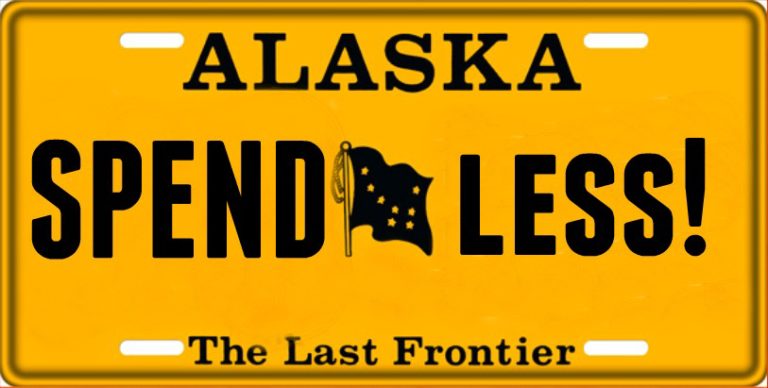By DAN FAGAN
It’s time for the Alaska Republican Party to come clean with its members and admit too many elected politicians with an R in front of their name are not conservative. Not even close.
This has become increasingly true in the state Senate.
Sen. Natasha von Imhof perfectly described the mentality some Republican senators hold when she described as greedy those favoring following the Permanent Fund dividend statutory formula law currently on the books and paying the full dividend. It’s not often you hear someone who frequently travels in her family’s private jet accuse others of greediness.
Von Imhof isn’t the only Republican-in-Name-Only in the Senate. There are Senators Gary Stevens, Bert Stedman, Click Bishop, and Josh Revak. For these RINO’s and like-minded seven Senate Democrats, the priority is government and the slew of special interests lined up to its oversized and generous trough.
Alaska’s feeble private sector lost 23,000 jobs last year. If legislators would follow the law and pay the full $3,500 dividend this year, it would provide a big boost for the private sector and help many of the small businesses that have either closed or are on life support.
But with Democrats and RINOs outnumbering conservatives in the House and Senate, the government sector takes precedent over the private sector.
The question then must be asked: Why do authentic conservatives continue to organize and form a caucus with the likes of Stevens, Stedman, Bishop, Revak, and von Imhof?
A source tells me conservative senators considered at the beginning of the year not organizing with Stevens, Stedman, Bishop, Revak, and von Imhof. I’m told they did so in hopes the RINOs might be willing to support their efforts to restore election integrity in Alaska. For the Senate’s conservative Republicans, this was a priority.
They set up their caucus as one where if eight members support an issue the others must follow. They thought they had eight conservative votes meaning Stevens, Stedman, Bishop, Revak, and von Imhof would have to support their priorities.
They counted on conservative votes from Sens. Shelley Hughes, Mike Shower, Mia Costello, Roger Holland, Robert Myers, Lora Reinbold, David Wilson, and Peter Micciche.
But something happened the conservative members didn’t see coming. Wilson and Micciche began to flip flop and vote with the Democrats and RINOs.
The real shocker came when Micciche single handedly killed the full $3,500 dividend in the Senate despite promising to support it during the campaign. It was Cathy Giessel all over again.
Senate conservatives also did not anticipate Republicans losing the House and believed they had enough support for an election integrity bill in that body. But then RINOs Kelly Merrick, Louise Stutes, and Sara Rasmussen abandoned the Republican caucus, giving control of the House to Democrats. Any hope of cleaning up Alaska’s elections died when that happened.
It’s difficult to blame Senate conservatives for trying to form a majority with RINOs. But at what point are they going to look at the long game?
When genuine conservatives organize with the likes of Stevens, Stedman, Bishop, Revak, and von Imhof, they give them cover. Refusing to organize with RINOs would at least show voters who the true conservatives are.
The result is the same even if conservatives were in the minority. Year after year the special interests and the Juneau Swamp always win.
Alaska’s state government has been disgustingly and morbidly obese since former Gov. Sarah Palin gave us the largest tax increase in state history with ACES.
According to a graph released this week by the think tank, Alaska Policy Forum, the state’s budget, not including federal funds or Permanent Fund spending, grew from $7.5 billion in 2010 to close to $12 billion in 2015. The 2015 budget, by far the highest in state history to date, was the last one submitted by Parnell before leaving office.
Alaska spends considerably more per capita than any other state. We hover around $15,000 per person each year. That’s triple the comparably populated South Dakota.
Donna Arduin worked with Gov. Michael Dunleavy as budget advisor when he was first elected. She’s one of the most respected budget advisors in the nation working with governors in California, Florida, Michigan, and New York. Arduin told me Alaska’s state budget was the most wasteful and bloated she had ever seen.
And yet RINOs and Democrats continue to fight to maintain government bloat and largess. They claim the state can’t afford the statutorily required full dividend this year.
But look closer at the numbers. The Permanent Fund earned more than $16 billion in the past year. At this time last year the fund was worth $65.3 billion. As of June 14, it was worth $81.4 billion. The fund earned more than an average of $43 million a day over the past 12 months. It took the fund less than two months to earn the money to pay the statutorily required dividend of $3,500 this year.
Keep in mind the feds also kicked in an additional $6.5 billion in Covid relief funds to Alaska. We don’t have a revenue problem; we have a spending one.
Alaska RINOs and Democrats are all about the health and vitality of government, not the working class. Isn’t it time for conservative legislators to stop organizing with them? It’s simply not working.
Dan Fagan hosts the number one rated morning drive talk show on Newsradio 650 KENI.








